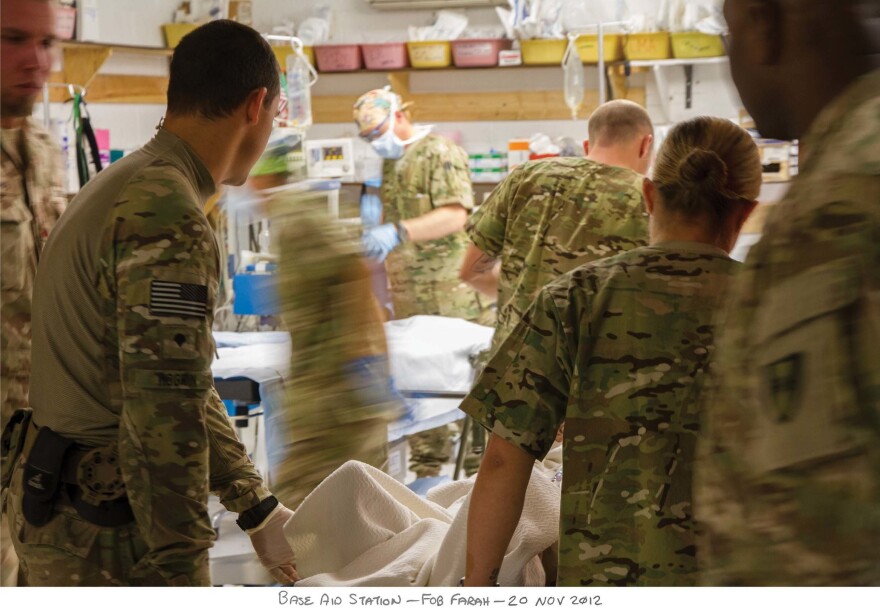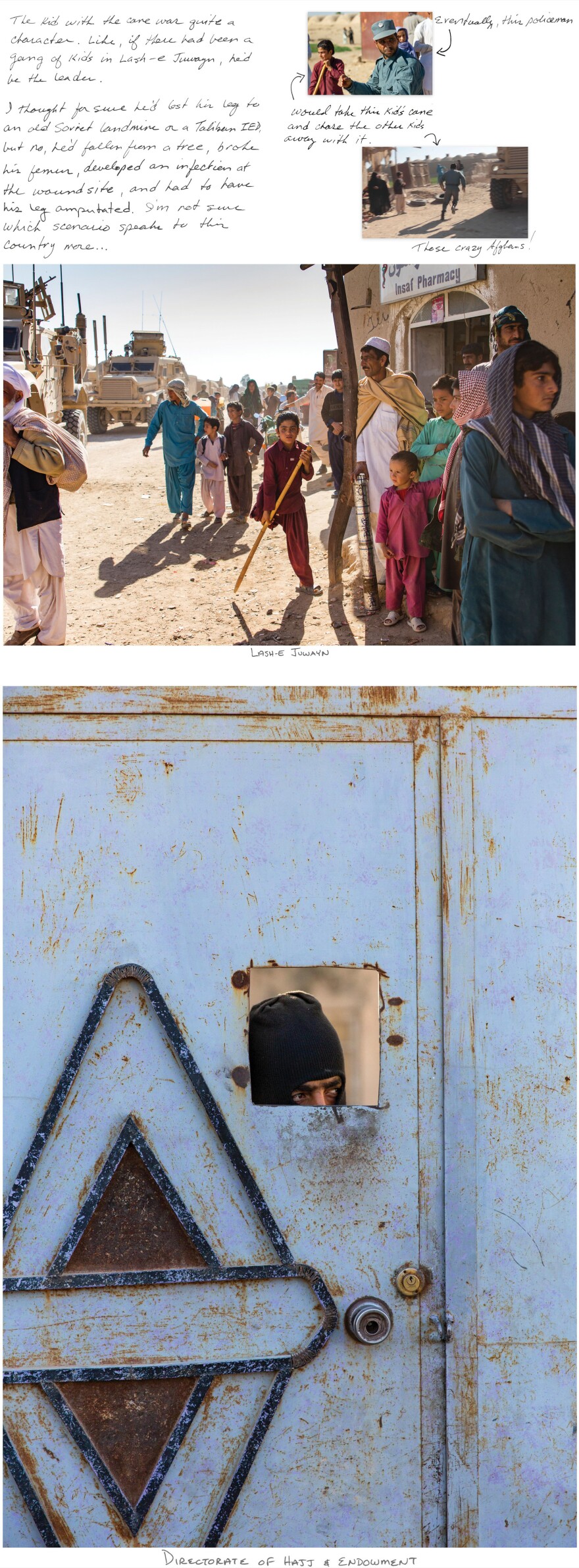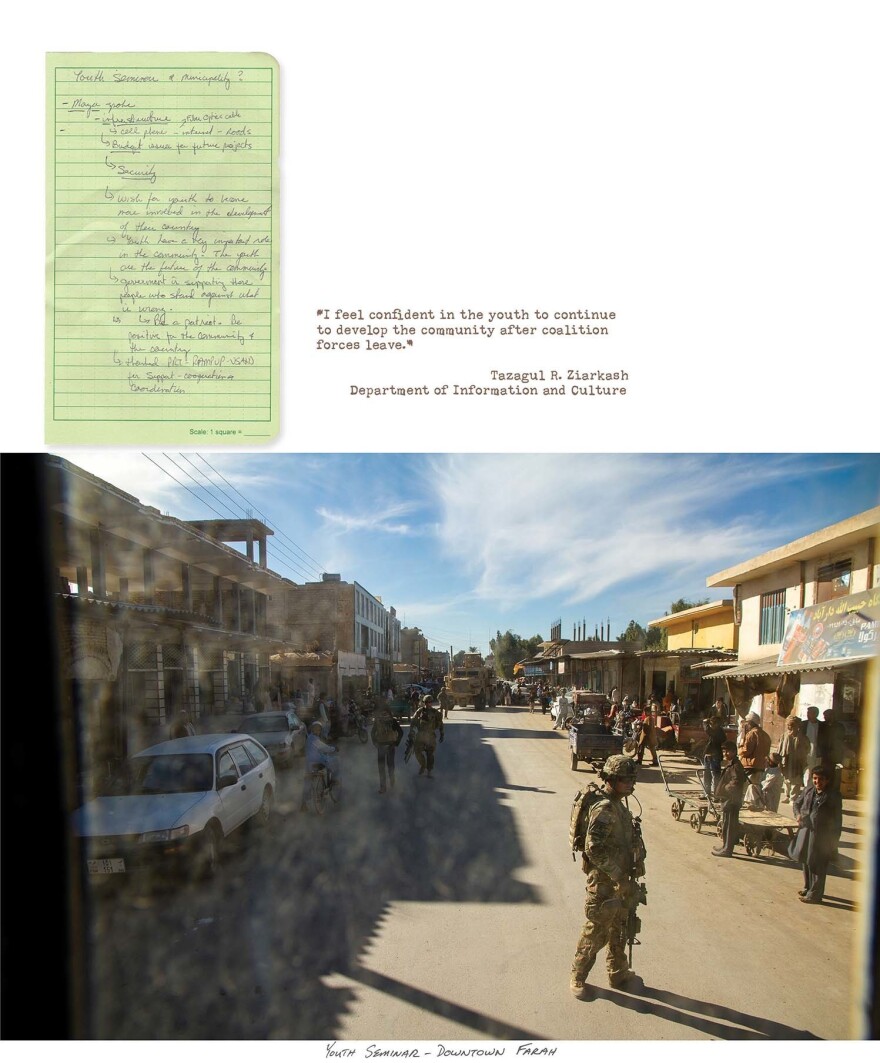After 24 years of service in the Navy, Chief Petty Officer Joshua Ives retired in 2015. He sifted through more than 15,000 photographs taken during his time in Afghanistan to make Noble Eagle, a mixed-media project that is part documentary, part personal reflection.
Ives deployed to Afghanistan in October 2012 and served at a Forward Operating Base (FOB) on the outskirts of Farah with 1,100 personnel from the U.S., Italy, Slovenia and Afghanistan. As the senior medic on the team, Ives managed the base aid station and a team of three Navy corpsmen and two Army medics. He also served as the team photographer during his deployment, documenting life on the base and in the local community.
The title of Ives' photography project references Operation Noble Eagle, the name given to the military operation launched by the U.S. and Canadian governments in response to 9/11. Each military member who deployed to Afghanistan was assigned a Noble Eagle number, a unique identifier used for tracking that indicated the duties, roles and functions assigned to them.
For Veteran's Day, NPR talked to Ives about his military service, the Noble Eagle project and his reflections on Afghanistan, then and now.


Q: In the text about your Noble Eagle project, you write: "I wanted to go to war. I needed to go to war." Why did you feel this way?
Simply put, I wanted to go to war because so many of my military brothers and sisters had been and I had not. When I deployed, I was a Chief Petty Officer working at a small Navy medical facility in southern Maine. The U.S. had been at war in Afghanistan for more than a decade, which was almost half of my career. I didn't want to be someone who went his entire career without going to war. I wanted to pull my weight. Also, there's a certain amount of camaraderie within military circles after people have gone to war, and I wanted that.

Q: What originally motivated you to join the military?
When I was 20, I was living at my mom's place in the small, one-stoplight town of Cooperstown, N.Y. where I'd grown up. I'd been a mediocre high-school student at best, with no aspirations of going to college and no real sustainable or marketable skills. I had a job as a snowboard instructor at a small ski resort. I wasn't making much money, but it paid just enough to cover gas for my little Ford Escort to and from work.
I'd never seriously considered enlisting in the military, but one night, mid-season, someone stole my snowboard. Without it, I needed to figure out another way to make a living. Around the same time, a high-school buddy returned from Navy boot camp. We hadn't always made the best decisions together, but after 12 weeks of boot camp, he was this squared-away guy, standing tall, with a sense of pride and purpose and direction. I was inspired and motivated to do better. Within a few weeks, I enlisted in the Navy and awaited orders to report to boot camp. As corny as it sounds, having my snowboard stolen was a life-changing event.

Q: You were both a medic and a photographer while deployed in Afghanistan. What was it like to photograph in this setting?
Our primary medical mission was to maintain a base aid station and provide essential medical support and services to the 1,100 coalition and Afghan personnel living on the FOB. There was a steady flow of casualties the entire time I was there–a mass casualty event at least weekly.
I was assigned to do photography because the combat camera airman assigned to Provincial Reconstruction Team Farah was pulled away from the deployment at the last minute.
It was the best of both worlds, as far as I was concerned. FOB life can get pretty dull because you're confined within the thick, dirt-filled, Hesco barrier walls day after day after day for months on end. It was great to break up that monotony by getting off base and documenting the work with Farah's leadership and the Afghan people. It was also an incredible opportunity to meet and talk with locals and get a glimpse of their daily lives.
And, everything melted away when I had the camera up to my face. I was acutely aware of where we were, what we were doing and that maybe someone wanted to kill us. But looking through the lens was oddly relaxing, like being in another world. It probably helped a bit knowing I was carrying a rifle and pistol and a bunch of ammo, as were the 10-20 soldiers and sailors around me. But even today, without weapons and ammo, everything else takes a back seat when I'm making photos. I don't get hungry or thirsty, the cold is less cold, the heat is more bearable.


Q: What inspired you to make the Noble Eagle photo project?
After I retired, I became a 48-year-old, full-time undergraduate student surrounded by teens and twenty-somethings, with whom I felt I had almost nothing in common, except for photography. I was suffering from some depression and anxiety and was in a dark place. I felt like an outsider and would comment to my professors and a couple of fellow veterans that being deployed to Afghanistan was much easier than being in school.
I looked back through the 15,000 pictures I made during my deployment for a class project. I culled them down to around 25-30 images and put them in a sequence that spoke to my experience, including some that are probably not the stereotypical images that people might expect of war. I also included a couple of images from home because memories of home were an important part of life on the FOB.
I hadn't intended for the project to be profoundly introspective or even therapeutic, but it turned out to be that way. Looking back, it was just what I needed as I was transitioning and readjusting to civilian life, because it gave me a chance to revisit my military experience with fresh eyes.


Q: Your work notes gives us a glimpse of your daily routine and the use of poetry feels very reflective. Tell us a bit more about life on the base in Farah.
The first note in the project is from a morning leadership meeting, which captures the essence of daily life on the FOB fairly well: can we use military assets to evacuate the Chief Justice of Farah; who's suffering from gunshot wound complications; what's the status of the medical incinerator; the team that's replacing us will begin to arrive in five weeks; we're having pizza tonight.
Pizza nights on Thursdays gave everyone a little taste of home and were a highlight. But, it was always important to not get too comfortable with your surroundings. Even in the relative safety of the FOB, you always had to be vigilant and try not to let your guard down. For example, when I went for a run on the FOB, I always knew where the closest ditch or berm or obstacle was in case I had to take cover.
At times it could be emotionally draining. One day, we're conducting photojournalism training for Afghan women who want to take part in shaping their country's future; the next day we're visiting an Afghan displaced-persons camp where it's hard to imagine anyone having a marginally promising future. Then the following day we are triaging and treating wounded and bloodied Marines. And then the cycle would start all over again.

Q: Can you talk about an image from the project that has a lot of meaning for you?
One image that sticks with me shows the aftermath of treating casualties. I took it in the aid station after spending hours attending to several wounded Afghans–some of them didn't make it. When I walked out, folks were heading to the chow hall for dinner, going to the gym and just hanging out. I was smacked with the reality that no one knew what we'd just seen and done. It was just another day on the FOB for everyone else.
At the time, it hit me hard that not everyone knows what's happening in my world–and I don't know everything that's happening in theirs. People are quietly addressing their own struggles every day, and not everyone on the outside knows about it. It's something I think about quite a bit.

Q: The U.S. recently ended its engagement in Afghanistan. What feelings did you have as U.S. troops withdrew?
I can't help but think about the bleak future ahead for so many young boys and girls in Afghanistan. That said, I also think that we did many good things and made a positive impact in many individual Afghan lives–so maybe they'll be the ones who fight back and eventually make it their own.
I hope that one day, the people of Afghanistan can know and experience peace throughout their country.



Joshua Ives recently completed a master's degree in multimedia, photography and design from the S.I. Newhouse School of Public Communications at Syracuse University. He lives Clinton, N.Y. and works as a freelance photographer and a photo studio assistant. Follow him on Instagram @joshua_r_ives.
Copyright 2023 NPR. To see more, visit https://www.npr.org.




